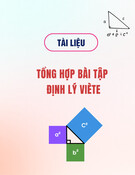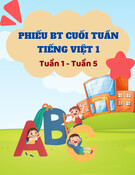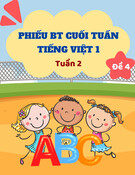
REVISION FOR THE SECOND TERM GRADE 9 – 2020-2021
I/ Simple Past -> Present Perfect
1) This is the first time I have seen him =>I have never seen him before
The first time + S + have/ has + V3/ ed + …
S + have/ has + never + V3/ ed ...before
2) I started/began studying English 3 years ago. => I have studied English for 3 years.
S + started/ began + V (ing)/ To + V(inf) + thời gian trong quá khứ
S + have/ has + V(ed/c3) + for/ since + thời gian
3) I last saw him when I was a student. => I haven't seen him since I was a student.
S1 + last + V2/ ed + when + S2 + V2/ ed ……..
S1 + have/ has + V3/ ed + since + S2 + V2/ ed ……..
4) The last time she went out with him was two years ago -> She hasn't gone out with him for two years.
The last time + S + V2/ ed + …… + was + thời gian trong quá khứ
S + haven’t/ hasn’t + V3/ ed + ……………… + for/ since + thời gian
5) It's ten years since I last met him. => I haven't met him for ten years.
It's + thời gian + since + S + last + V2/ ed + ……
S + haven't/ hasn’t + V3/ ed + …+ for/ since + thời gian
6) When did you buy it? => How long have you bought?
When + did + S + V0/ Vs/ es …..?/ How long ago + did + S + V0?
=> How long + have/ has + S + V3/ ed?
II. Conditional sentences type 1. (Câu điều kiện loại 1)
1. Form
IF CLAUSE (Mệnh đề If)
MAIN CLAUSE (Mệnh đề chính)
Simple Present (Thì hiện tại đơn)
If + S + am/ is/ are
If + S + V (s/es)
If + don’t/ doesn’t + V (nguyên mẫu)
Simple Future (Thì tương lai đơn)
S + will/ won’t + V (bare infinitive)
S+ can/must/ may/ might+ V(bare infinitive)
Eg 1. If I have enough money, I will buy a big house.
Eg 2. If you want to pass the exam, you must study harder.
Eg 3. If she doesn’t want to be late, She must get up early.
2. Usage: Câu điều kiện loại 1 là câu điều kiện diễn tả tình trạng có thật ở hiện tại hoặc tương lai.
Eg. If you learn hard, you will pass the exam.
Eg. If the factory continues dumping poison into the lake, all the fish and other aquatic animals will die.
Chú ý Thì hiện tại đơn có thể được dùng trong mệnh đề chính để diễn tả một điều kiện luôn đúng
II. Conditional sentences type 2. (Câu điều kiện loại 2)
1. Form.
IF CLAUSE (Mệnh đề If)
MAIN CLAUSE (Mệnh đề chính)
If +S + V-ed/2
If + S + didn’t + V (nguyên mẫu)
If + S + were
S + would/ could/ might + V (infinitive)
S + wouldn’t/ couldn’t +V (infinitive)
Eg 1. If I became rich, I would spend all my time travelling.
2. Usage
- Câu điều kiện loại 2 là câu điều kiện không có thật thường dùng để nói lên sự tưởng tượng của người nói. (Điều
kiện không thể xảy ra ở hiện tại hoặc tương lai).
Chú ý Trong mệnh đề không có thật ở hiện tại, chúng ta có thể dùng were thay cho was trong tất cả các ngôi trong
mệnh đề If.
Eg. If I were you, I would study English hard.
III. Relative Clause: Mệnh đề quan hệ
1/ Relative Clause: Mệnh đề quan hệ (mệnh đề tính từ) bắt đầu bằng các đại từ quan hệ: who, whom,
which, that, whose hay những trạng từ quan hệ: why, where, when. Mệnh đề quan hệ dùng để bổ nghĩa
cho danh từ đứng trước nó.
relative clause = Relative pronoun + ……………
( Who, whom, which, that…)
2/ Có 2 loại mệnh đề quan hệ
Defining relative clause : Là mệnh đề được dùng để xác định danh từ đứng trước nó,cần thiết cho ý nghĩa của câu;
không có nó câu sẽ không đủ nghĩa. Tất cả các đại từ quan hệ được sử dụng trong mệnh đề xác định.
Nondefining relative clause: Là mệnh đề cung cấp thêm thông tin về người hoặc vật, không có nó thì câu vẫn đủ nghĩa.
EX: The man who helped us lives here

Defining relative clause
Lan,who lives opposite my house,is working in the factory
Nondefining relative clause
3/ Relative Pronoun: đại từ quan hệ
Là từ dùng thay thế cho danh từ đứng trước nó nhằm tránh lặp lại danh từ đó lần nũa ở mệnh đề tính ngữ phía
sau. Nó luôn được đặt ngay đầu mệnh đề tính ngữ và ngay sau danh từ mà nó thay thế.
Eg: Người đàn ông mà tôi gặp sáng nay là bố tôi.
Mệnh đề tính ngữ: vì mệnh đề này bổ nghĩa cho danh từ “người đàn ông. Trong tiếng Anh, ta sẽ
dùngcác liên hệ đại từ sau để thay cho danh từ:
Who: thay danh từ chỉ người
Whom: thay danh từ chỉ người, làm tân ngữ trong mệnh đề tính ngữ
Which thay danh từ chỉ vật, làm chủ ngữ hoặc tân ngữ trong mệnh đề tính ngữ
That: thay cho who, whom, which trong mệnh đề tính ngữ không xác định ( khi co dâ u , ta không dung that)
Whose: thay danh từ chỉ người,hoặc vật chỉ sở hữu cho danh từ trong mệnh đề tính ngữ
Where: thay cho danh từ làm trạng ngữ chỉ địa điểm trong mệnh đề quan hệ
When: thay cho danh từ làm trạng ngữ chỉ thời gian trong mệnh đề quan hệ.
IV. Verb Patterns: To Verb , Verb , V-ing
A/. To verb
1/. Verb + To verb Dùng To verb sau các động từ: agree, decide, manage, pretend, tend, attempt, offer, refuse, expect,
forget, help, hope, promise, refuse, try, want, would like, plan, need, learn, teach......
2. Verb + O + To infinitive: Dùng To verb sau các động từ: ask, require, request ( yêu cầu, đề nghị), tell ( bảo, nói),
advise( khuyên), help, invite, want,
3. be + adj + to verb
4. Cấu trúc chủ ngữ giả
IT + BE + ADJ….. + to verb….
B. Bare infinitive:
1. Modal Verbs + verb: Dùng verb sau các động từ modal verbs: can/ could = be able to, may/ might, must = have to,
should = ought to, will, shall, would, used to( đã thường)
2. Help+ O + Verb / to verb ( Giúp ai làm gì đó )
3. make / let + O + Verb ( khiến/ cho phép ai làm gì đó)
4. Have + S.O + verb ( khiến ai làm gì đó)
C/ . V- ING
1. Verbs + V-ing: dùng sau các động từ
- begin, start, keep, continue, finish, stop, hate, love, like, dislike, enjoy, prefer , avoid, mind, practise, spend + time,
admit, deny, discuss, mention, mind, give up, put on, put off, go on…..
2. GIỚI TỪ + V- ing ( in, on, with, of, about, without, after, before, at, …..)
D/ V + to verb Hoặc V- ing
1. Begin/ start/ continue/ like/ love/ prefer/ hate + Ving / V to inf mà không thay đổi về nghĩa.
2. Các trường hợp có thay đổi về nghĩa
1/ remember + V-ing: Have a memory of doing something - remember + to verb : Do St you have to do
2/ Forget + V-ing: Not remember a past even - Forget + V verb Not remember St you have to do
3/ Try + to verb Do st to discover its qualities or effects - Try + to verb Make an effort to do something
4/ Stop + V-ing Stop an action - Stop + V to verb : interrupt an action to do St else
V. EXERCISES
I/ Rewrite the following sentences with the words given:
1.Minh last wrote to his pen pal five months ago.-> Minh hasn’t …………………………………………..
2.The last time we visited Kuala Lumpur was 3 years ago.-> I haven’t …………………………………………………
3. They began building this house 2 months ago-> They have ………………………………………
4. My father started to work in this factory last week.-> My father has…………………………………………
5. How long has he worked in the garden? -> When …………………………………………………?
6. He started living in Ho Chi Minh city when he was 8.-> He has ………………………………………………………
7. My father stopped smoking two years ago.-> My father hasn’t …………………………………………………………
8. The last time Lan went to the zoo was two years ago.--> Lan …………………………………………
II. Complete the second sentence in each pair so that it has similar meaning to the first sentence.
1. If you cook the vegetables too long, the vitamins in it will be destroyed.
→ Cooking__________________________________________________________
2. They are preparing your food right now.
→ Your_____________________________________________________________
3. Follow these safety instructions or you may get burnt.
→ If you____________________________________________________________

4. I suggest having spaghetti and pizza tonight.
→ Let’s_____________________________________________________________
5. Eating healthy foods is very important.
→ It is______________________________________________________________
III. Finish each of the following sentences so that its meaning stays the same.
1. Someone stole my camera while I was walking round the museum. (had)
→ I __________________while I was walking round the museum.
2. She has never read such an interesting article about space exploration. (most)
→ It ________________________________________________________________
3. They require special permits to access Son Doong Cave.
→ Special permits _____________________________________________________
5. You don't need to book tickets for the show in advance. (necessary)
→ It ________________________________________________________________
IV. Rewrite the sentences using the conditional sentences type 2.
1. I learn ten new items of vocabulary a day. I can speak English with foreigners easily.
→ If I____________________________________________________________
2. She goes to an English speaking club every week. She speaks English fluently now.
If she____________________________________________________________
3. I think you should spend more time listening to the radio, watching TV and practicing speaking English with your
friends to improve your English.
→ If I were________________________________________________________
4. I am a lot worried about the English exam because my vocabulary is poor.
→ If my vocabulary_________________________________________________
5. Jenny is very good at English because she goes aboard at every summer time.
→ If Jenny________________________________________________________
6. I can’t look the word up because I haven’t got a dictionary.
_________________________________________________________________
7. The wind is blowing hard, so I won’t take the boat out for a ride.
_________________________________________________________________
8. Nick can’t find the way because he hasn’t got a map.
_________________________________________________________________
9. I don’t know enough about machine, so I can’t mend it myself.
_________________________________________________________________
10. I don’t ride the bus to work every morning because it’s always so crowded.
_________________________________________________________________
11. She can't buy the dictionary because she doesn't have enough money.
_________________________________________________________________
12. I don't speak English, so I can't communicate with some tourists from England.
_________________________________________________________________
VI Rewrite the sentences,
1. People live in Scotland. They are called Scots.
→ The people _______________________________________________________
2. Arthur Conan Doyle was born in Edinburgh. He wrote the Sherlock Holmes stories.
→ Arthur Conan Doyle _______________________________________________
3. You should apologize for the misunderstanding to her.
→ If I were _________________________________________________________
4. It was such an interesting show that millions of viewers watched it.
→ The show was so ___________________________________________________
5. I prefer staying at home watching TV to going out for a coffee.
→ I’d rather _________________________________________________________
6. I can't meet my girlfriend because I have to study.
→ If I didn't _________________________________________________________

7. I won't enjoy the film if you aren't with me.
→ Unless you _______________________________________________________
8. A monk is a man. The man has devoted his life to God.
→ A monk _________________________________________________________
9. A herbivore is an animal. The animal feeds upon vegetation.
→ A herbivore ______________________________________________________
10. Sydney is the largest Australian city. It is not the capital of Australia.
→ Sydney __________________________________________________________
VII. Complete the second sentence using the word given,
1. Sylvia doesn't have enough money, so she can't buy a new computer. (enough)
→ If Sylvia _______________________, she would buy a new computer.
2. I think you should tell your parents the truth. (were)
→ If I _______________________ , I would tell your parents the truth.
3. My cousin has decided that he isn't going to finish his engineering course. (drop)
→ My cousin has decided _______________________his engineering course.
4. All Emma’s teachers say that she is able to do much more. (capable)
→ All Emma's teachers say that she _______________________much more.
5. I was really pleased that I managed to pass the exam. (succeeded)
→ I was really pleased that I _______________________ the exam.
VIII. Fill the second sentence so that it has a similar meaning to the first one,
1. Although the Internet has some bad effects, more and more people use it.
→ In spite of_______________________________________________________
2. The weather was very bad, so they had to cancel the live show.
→ Because of______________________________________________________
3. He bought a newspaper to read about the football match through he saw it on TV last night.
→ In spite of_______________________________________________________
4. Although Tom was a poor student, he studied very well.
→ In spite of_______________________________________________________
5. Although she has a physical handicap, she has become a successful woman.
→ Despite__________________________________________________________
6. In spite of the high prices, my daughter insists on going to the movies.
→ Even though______________________________________________________
7. In spite of his good salary, Jack gave up his job.
→ Although_________________________________________________________
8. She told me the secret, despite having promised not to do so.
→ Although_________________________________________________________ .
IX WRITING SKILLS:
1. Write a paragraph about the eating habits of a classmate
2. Write a paragraph about the uses of English in everyday life.
3. Write a paragraph about the roles of teenagers in the future.
4. Write a paragraph about the qualities one needs to be able to do a certain job.
5. Write a paragraph about One of the drawbacks of tourism in your area/ city / place
C. READING
I. Read the paragraph and choose the most suitable answer A, B, C or D for each of the gaps.
I started (1)_______ English when I was 14 years old after five years of studying Russian. In the (2)_______ I
encountered some difficulties learning the language, but I tried my (3)_______ to overcome them. Firstly, my English
pronunciation was (4)_______ by the way I spoke Russian. To solve this problem, I practiced by listening to tapes in
English every day. I played the tape, stopped after each sentence, and (5)_______ the sentence several times. At school, I
joined an English speaking club (6)_______ was organised by a teacher from Britain. She understood my difficulty and
helped me very much in improving my pronunciation. Secondly, I found it really hard to learn English vocabulary. In
Russian, the way you write the word is the way you pronounce it. However, English spelling is often (7)_______ from its
pronunciation. To get over this difficulty I started using the dictionary. Whenever I learnt a new word, I looked it (8)
_______ carefully in the dictionary. Then I tried to remember the way to read and write the word. After that, I wrote the
word down several (9)_______ in a notebook. Gradually, I got (10)_______ to the spelling system of the language. Now
I’m confident that my English has become much better.

1. A. getting B.learning C.writing D.reading
2. A. start B.beginning C.end D.begin
3. A. most B.self C.best D.hard
4. A. effected B.given C.affected D.reflected
5. A. said B.told C.spoke D.repeated
6. A. which B.it C.and D.but
7. A. different B.the same C.far D.differ
8. A. down B.on C.out D.up
9. A. ways B.ways C.minutes D.lines
10. A .used B.remembered C.well D.attracted
II. Choose the word A, B, C or D - that best fits the blank space in the following passage.
Since the beginning of time, people have looked (1) _______at the stars and dreamed of going to space to (2)
________other planets. For many years, this was just a dream, but in the past 40 years, it has become a (3) _________
In the1960s,the Soviet Union and the United States were in a Frantic (4) __________ to get to space first. The
Soviets took an (5) __________lead by sending the first person into space, but then Americans (6) by sending the
first man to the moon.
(7) __________ the early days of space exploration, many people have gone into space,(8) __________men and women,
African Americans, Asians, and now (9) __________ civilians have gone to space too.
(10) __________, space exploration continues.
1. A. out
B. on
C. up
D. round
2. A. invent
B. develop
C. control
D. explore
3. A. reality
B. practice
C. truth
D. realistic
4. A. pace
B. race
C. fight
D. rush
5. A. overall
B. usual
C. extended
D. early
6. A. broke out
B. caught up
C. brought up
D. went through
7. A. On
B. In
C. Since
D. From
8. A. both
B. either
C. all
D. every
9. A. little
B. a little
C. few
D. a few
10. A. Consequently
B. However
C. Moreover
D. Therefore
III. Read the passage again, and then decide whether the sentences are true (T) or false (F).
Space Tourism means ordinary members of the public buying tickets to travel to space and back. Like any other
business, once space tourism gets started it will develop progressively. It may go through several phases. Starting with a
relatively small-scale and relatively high-priced “pioneering phase”, the scale of activity will grow and prices will fall as
it develops. Finally, it will become a mass-market business, like aviation today.
During the pioneering phase, customers will be relatively few, from hundreds per year to thousands per year;
prices will be high, $50,000 and up; and the service will be nearer to “adventure travel” than to luxury hotel-style.
The mature phase will see demand growing from thousands of passengers per year to hundreds of thousands per
year. Tickets to orbit will cost less and flights will depart from many different airports. Orbital facilities will grow from
being just clusters of modules to large structures constructed in orbit for hundreds of guests, permitting a wide range of
orbital entertainments.
During the mass phase, ticket prices will fall to the equivalent of the few thousand US dollars, and the number of
customers will be from hundreds of thousands to millions of passengers per year. And aviation is still growing fast at
today’s level of 1 billion passengers per year. So there is no reason to suppose that space travel will ever stop growing.
There is certainly no limit to possible destinations.
T
F
1. Space Tourism means ordinary members of the public buying tickets to travel to space
2. During the mature phase, orbital structures made on the Earth will provide a wide range of
entertainments.
3. The more space tourism develops, the less aviation grows.
4. Maybe some days in the future, space tourism is as popular as aviation.
5. Space travel will send passengers to destinations that know no limit.
IV. Read the following passage and then choose the best option A, B, C or D.
OUTER SPACE
From far out in space, Earth looks like a blue ball. Since water covers three- fourths of the Earth’s surface, blue is
the color we see most. The continents look brown, like small islands floating in the huge, blue sea. White clouds wrap
around the Earth like a light blanket. The Earth is shaped like, or a ball. It is 25000 miles around! It would take more than
a year to walk around the whole planet. A spaceship can fly around the widest part of the sphere in only 90 minutes.



![Tài liệu tham khảo Tiếng Anh lớp 8 [mới nhất/hay nhất/chuẩn nhất]](https://cdn.tailieu.vn/images/document/thumbnail/2025/20250806/anhvan.knndl.htc@gmail.com/135x160/54311754535084.jpg)










![Phiếu bài tập cuối tuần Tiếng Việt 1 tuần 2 đề 2: [Hướng dẫn chi tiết]](https://cdn.tailieu.vn/images/document/thumbnail/2025/20250728/thanhha01/135x160/42951755577464.jpg)

